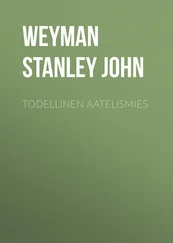Stanley Weyman - The Great House
Здесь есть возможность читать онлайн «Stanley Weyman - The Great House» — ознакомительный отрывок электронной книги совершенно бесплатно, а после прочтения отрывка купить полную версию. В некоторых случаях можно слушать аудио, скачать через торрент в формате fb2 и присутствует краткое содержание. Жанр: foreign_language, foreign_prose, на английском языке. Описание произведения, (предисловие) а так же отзывы посетителей доступны на портале библиотеки ЛибКат.
- Название:The Great House
- Автор:
- Жанр:
- Год:неизвестен
- ISBN:нет данных
- Рейтинг книги:4 / 5. Голосов: 1
-
Избранное:Добавить в избранное
- Отзывы:
-
Ваша оценка:
- 80
- 1
- 2
- 3
- 4
- 5
The Great House: краткое содержание, описание и аннотация
Предлагаем к чтению аннотацию, описание, краткое содержание или предисловие (зависит от того, что написал сам автор книги «The Great House»). Если вы не нашли необходимую информацию о книге — напишите в комментариях, мы постараемся отыскать её.
The Great House — читать онлайн ознакомительный отрывок
Ниже представлен текст книги, разбитый по страницам. Система сохранения места последней прочитанной страницы, позволяет с удобством читать онлайн бесплатно книгу «The Great House», без необходимости каждый раз заново искать на чём Вы остановились. Поставьте закладку, и сможете в любой момент перейти на страницу, на которой закончили чтение.
Интервал:
Закладка:
"Well trained," Audley continued in a whimsical tone, "fetches and carries, barks at the name of Peel and growls at the name of Cobden, gives up a stick when required, could be taught to beg-by the right person."
She laughed-she could not resist his manner. "But you are not very kind," she said. "Please to call a-whatever we need. He shall not do everything."
"Everything?" Lord Audley echoed. "He should do nothing," in a lower tone, "if I had my way."
Mary blushed.
CHAPTER VI
FIELD AND FORGE
The window of the clumsy carriage was narrow, but Mary gazed through it as if she could never see enough of the flying landscape, the fields, the woods, the ivy-clad homes and red-roofed towns that passed in procession before her. The emotions of those who journeyed for the first time on a railway at a speed four times as great as that of the swiftest High-flier that ever devoured the road are forgotten by this generation. But they were vivid. The thing was a miracle. And though by this time men had ceased to believe that he who passed through the air at sixty miles an hour must of necessity cease to breathe, the novice still felt that he could never tire of the panorama so swiftly unrolled before him.
And it was not only wonder, it was admiration that held Mary chained to the window. Her infancy had been spent in a drab London street, her early youth in the heart of a Paris which was still gloomy and mediæval. Some beautiful things she had seen on fête days, the bend of the river at Meudon or St. Germain, and once the Forest of Fontainebleau; on Sundays the Bois. But the smiling English meadows, the gray towers of village churches, the parks and lawns of manor-houses, the canals with their lines of painted barges, and here and there a gay packet boat-she drank in the beauty of these, and more than once her eyes grew dim. For a time Basset, seated in the opposite corner, did not exist for her; while he, behind the Morning Chronicle , made his observations and took note of her at his leisure. The longer he looked the more he marvelled.
He asked himself with amusement what John Audley would think of her when he, too, should see her. He anticipated the old man's surprise on finding her so remote from their preconceived ideas of her. He wondered what she would think of John Audley.
And while he pondered, and now scanned his paper without reading it, and now stole another glance at her, he steeled himself against her. She might not have been to blame, it might not have been her fault; but, between them, the two on the boat had put him in his place and he could not forget it. He had cut a poor figure, and he resented it. He foresaw that in the future she would be dependent on him for society, and he would be a fool if he then forgot the lesson he had learned. She had a good face, but probably her up-bringing had been anything but good. Probably it had taught her to make the most of the moment and of the man of the moment, and he would be foolish if he let her amuse herself with him. He had seen in what light she viewed him when other game was afoot, and he would deserve the worst if he did not remember this.
Presently an embankment cut off the view, and she withdrew her eyes from the window. In her turn she took the measure of her companion. It seemed to her that his face was too thoughtful for his years, and that his figure was insignificant. The eye which had accustomed itself to Lord Audley's port and air found Basset slight and almost mean. She smiled as she recalled the skill with which my lord had set him aside and made use of him.
Still, he was a part of the life to which she was hastening, and curiosity stirred in her. He was in possession, he was in close relations with her uncle, he knew many things which she was anxious to know. Much of her comfort might depend on him. Presently she asked him what her uncle was like.
"You will see for yourself in a few hours," he replied, his tone cold and almost ungracious. "Did not Lord Audley describe him?"
"No. And you seem," with a faint smile, "to be equally on your guard, Mr. Basset."
"Not at all," he retorted. "But I think it better to leave you to judge for yourself. I have lived too near to Mr. Audley to-to criticise him."
She colored.
"Let me give you one hint, however," he continued in the same dry tone; "you will be wise not to mention Lord Audley to him. They are not on good terms."
"I am sorry."
He shrugged his shoulders. "It cannot be said to be unnatural, after what has happened."
She considered this. "What has happened?" she asked after a pause.
"Well, the claim to the peerage, if nothing else-"
"What claim?" she asked. "Whose claim? What peerage? I am quite in the dark."
He stared. He did not believe her. "Your uncle's claim," he said curtly. Then as she still looked a question, "You must know," he continued, "that your uncle claimed the title which Lord Audley bears, and the property which goes with it. And that the decision was only given against him three months ago."
"I know nothing of it," she said. "I never heard of the claim."
"Really?" he replied. He hardly deigned to veil his incredulity. "Yet if your uncle had succeeded you were the next heir."
"I?"
"Yes, you."
Then her face shook his unbelief. She turned slowly and painfully red. "Is it possible?" she said. "You are not playing with me?"
"Certainly I am not. Do you mean that Lord Audley never told you that? Never told you that you were interested?"
"Never! He only told me that he was not on good terms with my uncle, and that for that reason he would leave me to learn the rest at the Gatehouse."
"Well, that was right," Basset answered. "It is as well, since you have to live with Mr. Audley, that you should not be prejudiced against him."
"No doubt," she said dryly. "But I do not understand why he did not answer my letters."
"Did you write to him?"
"Twice." She was going to explain the circumstances, but she refrained. Why appeal to the sympathies of one who seemed so cold, so distant, so indifferent?
"He cannot have had the letters," Basset decided after a pause.
"Then how did he come to write to me at last?"
"Lord Audley sent your address to him."
"Ah!" she said. "I supposed so." With an air of finality she turned to the window, and for some time she was silent. Her mind had much upon which to work.
She was silent for so long that before more was said they were running through the outskirts of Birmingham, and Mary awoke with a shock to another and sadder side of England. In place of parks and homesteads she saw the England of the workers-workers at that time exploited to the utmost in pursuance of a theory of economy that heeded only the wealth of nations, and placed on that wealth the narrowest meaning. They passed across squalid streets, built in haste to meet the needs of new factories, under tall chimneys the smoke of which darkened the sky without hindrance, by vile courts, airless and almost sunless. They looked down on sallow children whose only playground was the street and whose only school-bell was the whistle that summoned them at dawn to premature toil. Haggard women sat on doorsteps with puling babes in their arms. Lines of men, whose pallor peered through the grime, propped the walls, or gazed with apathy at the train. For a few minutes Mary forgot not only her own hopes and fears, but the aloofness and even the presence of her companion. When they came to a standstill in the station, where they had to change on to the Grand Junction Railway, Basset had to speak twice before she understood that he wished her to leave the carriage.
"What a dreadful place!" she exclaimed.
"Well, it is not beautiful," Basset admitted. "One does not look for beauty in Birmingham and the Black Country."
Читать дальшеИнтервал:
Закладка:
Похожие книги на «The Great House»
Представляем Вашему вниманию похожие книги на «The Great House» списком для выбора. Мы отобрали схожую по названию и смыслу литературу в надежде предоставить читателям больше вариантов отыскать новые, интересные, ещё непрочитанные произведения.
Обсуждение, отзывы о книге «The Great House» и просто собственные мнения читателей. Оставьте ваши комментарии, напишите, что Вы думаете о произведении, его смысле или главных героях. Укажите что конкретно понравилось, а что нет, и почему Вы так считаете.












